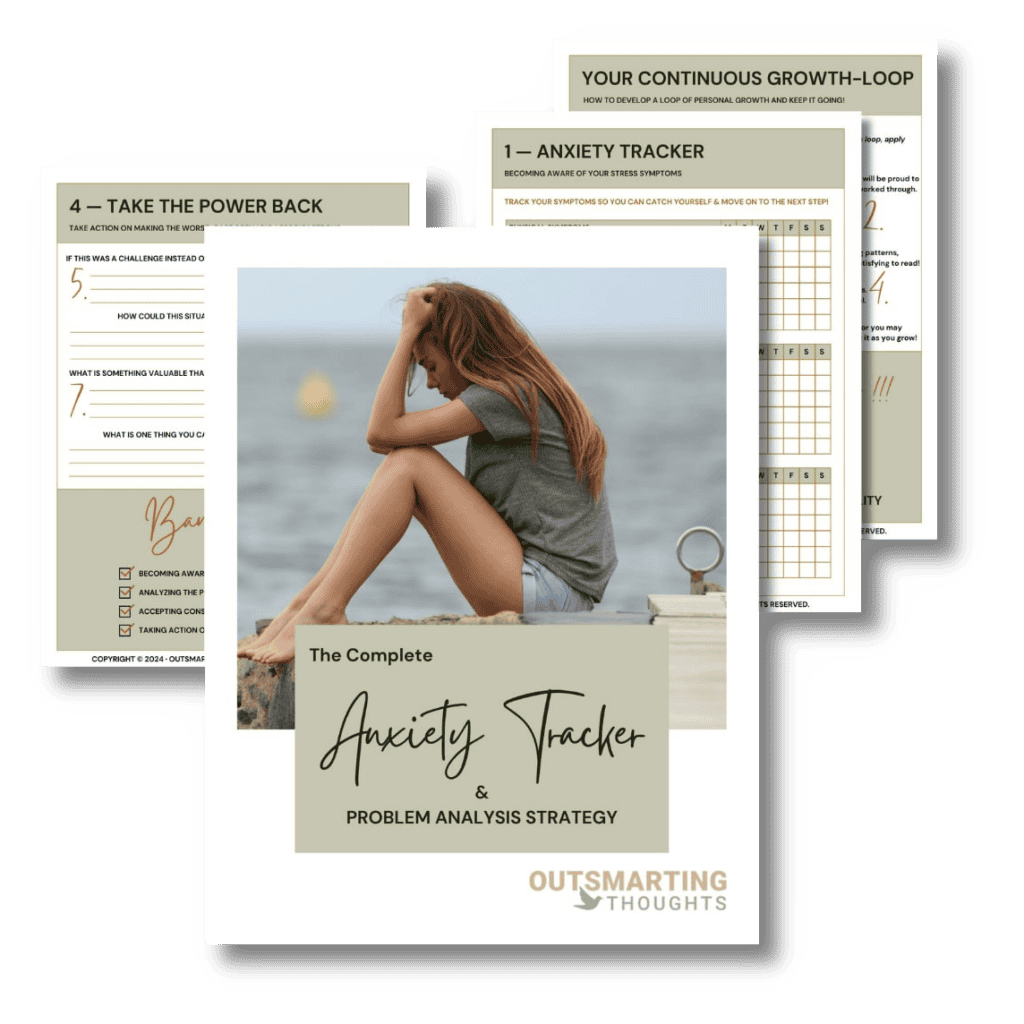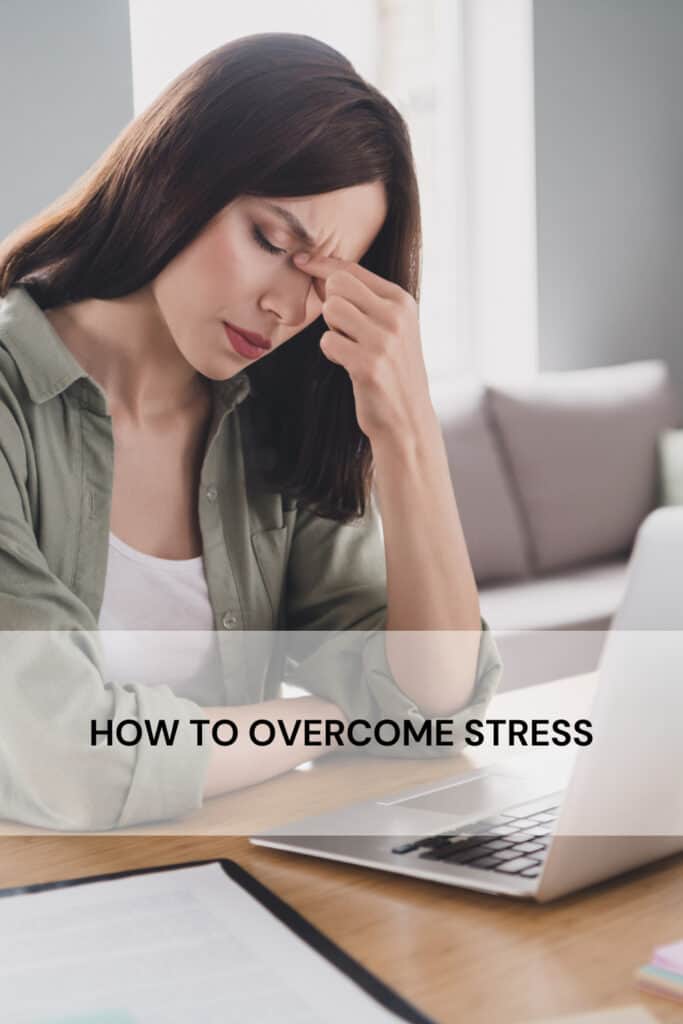Want to know how to overcome stress in a more natural and logical way? Here are some effective and practical strategies to develop a healthier mindset.
Managing stress can be extremely overwhelming and draining, and if you’re an overthinker and overachiever like me, you are doing all the research you possibly can to get a better grip on it. Stress gets a bad rep because of its disastrous effects on our lives, but interestingly enough is a fundamental part of Nature and growth!
You are going to learn how to overcome stress in a more organic way, and how to tackle your anxiety with an effective problem analysis strategy. You’re also going to learn how to reduce stress FAST.
After learning how to overcome stress more organically, you are going to feel stronger, happier and more resilient. It will give you the right tools to accelerate personal growth and achieve that kick-ass confidence. Now, let’s dive in & see how we can play stress out to our advantage!
This post is all about how to overcome stress naturally with practical strategies to gain a healthier mindset.
How To Overcome Stress
Please allow me to start by stating the unpopular opinion that stress isn’t bad or good. It can be both, and it depends on the ‘dosage’. No matter how OBNOXIOUS it feels when you have to endure it, there is no way you can erase it from this universe. Stress is inherent to Nature. This raises a question tho: WHY is it here?
Let’s look at stress in nature first. After all, when you forget to water your plants at home, it’s exposed to stress too. But plants that endure slight drought conditions develop better, more efficient root systems, eventually letting them reach the water more effectively. Funny isn’t it? It’s because of the stress that the plant becomes more resilient. Thanks to the hardship, it’s now stronger and more able to withstand future stresses.
Stress Is A Natural Component In Evolution & Growth
Stress is a natural part of life and plays an important role in evolution and growth. This is very important to keep in mind, because it’s the reason why it’s still here: to help us grow, adapt to environmental changes, and evolve. In Nature, stress acts as a trigger for resilience and development. Just look at all those marathon runners, mountain climbers, and other bad-ass people on this planet. Aren’t they that strong and confident thanks to the certainty they have about being able to endure hardship?
This gets us to our second question: Where then, is the line in the sand, between healthy stress (also called ‘eustress‘) and unhealthy stress? If you keep torturing your symbiotic friend with drought much longer, it will of course die. This is what we’re aware of when we talk about stress in general: it’s mainly something to avoid, not to seek out. The plant in the example only got stronger because it was exposed to moderate stress. Harsher conditions like a longer duration or a heavier intensity will flip the script and cause either damage or death.
The Curious Polarity Of Stress & Eustress
Curious polarity in itself, isn’t it? Evolve and enjoy growth, or, experience damage and face death. Hans Selye, the founder of the stress theory, stated that stress is the body’s automatic reaction to any demands made upon it. He was the first scientist to identify stress as the driver of illness: Being uncomfortable and stressed eventually leads to sickness. But wait, what about the plant and the strength? We’re here to overcome stress after all. How do we flip the script from damage to growth?
We already know that moderation of stress was a key factor. The differences between eustress and stress are based on three factors: duration of stress, intensity of stress, and the perspective of the one enduring stress. Unfortunately, duration and intensity are usually not in our control. Nothing to do about it. But perspective!? That’s 100% in our control!
RELATED POST:
How To Avoid Stress: An Overachiever’s Strategy For Staying True To Yourself & Your Emotional Truth
Recent research from Crum & Salovey actually proved that people who treat stress as a challenge instead of a threat, experience WAY better results. This means that your perspective is the strongest tool for transforming stress into eustress. This is where an actual mindset shift, something that’s within your power 24/7, can relieve a lot of pain. But- Ick! Mindset!? Lately, this word has been a little worn out on the internet. Many people misuse this terminology as if it’s only a conscious choice to make. Just a flick of the switch, something you ‘just do.’ Often, when I hear this myself, I feel a little guilt-tripped on top of all the shit that is already going on, as if it’s my ‘attitude problem’!?
The real difficulty of the problem is, that our experience of stress happens extremely unconsciously. Our body just does this for us, without us even having to be aware of what’s going on. Making the problem conscious and gaining awareness is an extremely hard thing to do. The steps and questions are simple in themselves, sure, but it does actually require you to do a fair amount of ’emotional homework’, and usually that means facing some demons.
Let’s make it a little bit more practical & dive into our problem analysis strategy. We made a little printable & anxiety tracker to help you out even more. Simply fill out the form below:

Want a free
ANXIETY TRACKER &PROBLEM ANALYSIS STRATEGY? Overcome your anxiety and stop overthinking with this
FREE Anxiety Tracker & Problem Analysis Strategy
Simply fill out the form below to get this strategy
delivered straight to your inbox!
Problem Analysis Strategy
Before we can start overcoming stress, we need to become aware that we are experiencing unconscious behavior instead of identifying with it. We have to recognize that we are ‘under its spell‘ in the first place. Selye, The Father of Stress, introduced us in the thirties of the previous century to the three stages of stress:
- ALARM: You’ll recognize this stage by the Fight- or Flight Response, feeling reactive and ‘triggered’.
- RESENTMENT: This is the moment where overthinking and other coping mechanisms kick in and run wild.
- EXHAUSTION: The moment you start breaking down, burning out, and eventually enter disease, and at worst, death.
To overcome stress, you first and foremost need to catch yourself having a stressful reaction in one of these stages. Usually, we think it’s ourselves who are responding instead of the stress reacting for us, but that would imply that you made a conscious decision about it, and most likely, you didn’t. If you find yourself snarking at your partner because you got triggered about something, feel the light bulb go off and realize: This is not me, this is me having a stressful reaction. The same for the resentment stage: If you realize this is the sixth night you’re lying in bed staring at the ceiling, overthinking what to do if you lose your job, you are subconsciously running a coping mechanism in hopes of finding a safety strategy to a stressful problem. If by now you’re overwhelmed and feel like things are more out of control than you’d prefer, we’ve got you covered:
RELATED POST:
How To Cope With Being Overwhelmed: The Case For Taking Back Control
Catching Yourself
Even when you catch yourself in that last stage, do NOT lose spirits or get demoralized, it’s never too late to turn the wheel around and change the course. This is the beauty of it. You can become aware of the unconscious by recognizing its pattern, usually symptoms you experience because of the stress. Write these down in a diary or your time management software, so you can recognize them faster in the future, and connect the dots on your symptoms and stress. Then, start taking back control. Let’s dive a little further into the steps of our problem analysis strategy.
You want to transform stress into eustress as much as you possibly can. To do this, you know you need a change of perspective, which you start by making the subconscious stressor, tangible, visible, and conscious. So, very simply said, to overcome stress, you need to do a little digging about what the problem really is. You need to go multiple layers deep to find the root of the problem. I can spoil you now, it always has to do with confusion and/or feeling unsafe. Our brain’s FIRST priority is survival and safety, and after that avoidance of pain. Uncertainty will keep you stuck in brain fog because it simply feels too unsafe. There’s cognitive dissonance in it. Something caused our ‘stress alarm bell’ to go off, so what is it really about?
How To Relieve Stress Quickly
This is where your research and problem analysis starts. You have to discover which unconscious threat is triggering your ‘stress alarm bell’. If your physical state is way too vibrant with stress to enter detached problem-solving, either get a shower or get some exercise in FIRST. Your body will naturally burn up cortisol and the stress vibing you up will be reduced. Keep at your research, but detach emotionally. Take a step back from it all, and observe with curiosity. Keep it very factual, as if you are the lawyer arguing a case: What is it that causes you to feel unsafe or confused? Is it emotional, or social pain instead of physical pain? Now is the time to go all in on being your own personal detective and start up a new investigation.
To overcome stress you first become aware of the symptoms and triggers signaling threat. Then you change the perspective of the threat into something that feels within your control. This we do with the 3 steps of our problem analysis strategy:
- GATHER AS MUCH ‘DATA’ AS YOU CAN & ANALYZE THE PROBLEM
When you recognize that you’re experiencing stress, it’s time to analyze the problem. You want to gain clarity on what’s really going on. After all: a problem well stated is a problem half-solved. Take a step back from your emotions, step into detective mode, and observe and research your feelings as if they were lab rats. What is it they fear? Why are they feeling unsafe? What are they confused about? What’s the worst that can happen? Which consequences are unbearable for them? WRITE IT DOWN. Do not let it continue to swarm around in your head. Grab a whiteboard if you can. Make sure you place your thoughts and research somewhere where you can SEE it. It has to become tangible and observable. - ACCEPT ALL CONSEQUENCES & TAKE FULL RESPONSIBILITY
Coming to terms with the consequences of the problem is extremely hard to do because blame, shame, and guilt do not give up without a fight. These 3 will do nothing but keep you stuck tho. It’s only by taking responsibility that you can move on and find resolve. Refusing to accept consequences is to keep yourself, for some part, in DENIAL. To not take ownership of your problems and take responsibility is to leave your fate in the hands of others. At this point, it doesn’t matter if somebody else caused you harm. If they’re not willing to justify their behavior, you’re at the losing end. Accept their shortcomings and see what YOU can do instead. I know this sucks and I’m sorry, I wish there was another way, but it’s time to rip the bandaid off and bite through the pain. - FIND WAYS TO MAKE THE WORST-CASE SCENARIO LESS DISASTROUS
Funnily enough, a wonderful thing happens after acceptance. All of a sudden you feel able to make decisions again. You can concentrate and think clearly again. One of the biggest reasons overthinkers keep overthinking is because they never reach a decision of what to do about it. Worry and stress cause brain fog, which keeps you stuck. Responsibility is taking the power back: You’re finally back in control again. After step 2, you can have a fresh look at your problems. Now is the time to decide what to do about it, and make sure you start carrying out that decision immediately. Place the calendar blocks in your time management strategy, prepare the hard conversation you need to have on paper or start looking for other jobs. When you start doing and start taking action on the worst-case scenario, your body will release the stress even more.
How To Overcome Stress (Summary)
Things will still stuck, don’t get me wrong, but the powerlessness will be transformed into empowerment, from threat into challenge. This is where stress becomes eustress. For the perspective and mindset shift to be a successful help in making stress more ‘manageable’, you need to feel that sense of control again. Regaining control is the key component of having a ‘better perspective’, as it will make you feel more safe and secure.
When you start practicing this method of overcoming stress, you will gradually become faster at working through the steps. It will make you more resilient, level you up at intense speeds and skyrocket your confidence into a badass state. Don’t let the muggles get you down.
This post was all about how to overcome stress naturally with practical strategies to help you get a healthier mindset.
We aim to help you out as much as possible, but please keep in mind that the content is only for general informational and educational purposes. We offer our services based on independent research and life-experience only, and so our strategies can never serve as a substitute for professional advice. Trust me, we do not have 'everything figured out', are all still huge works in progress, but hey, what works for us, might work for you too! This is allll up for you to decide... It might not work for you, and that's okay, so cherrypick the stuff that resonates and leave the stuff that doesn't, and let's go!








